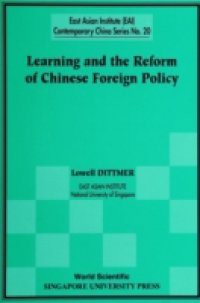This volume looks at China's foreign policy from the perspective of learning theory, a relatively new approach to foreign policy analysis based on social psychology. It begins by attempting to conceptualize China's distinctive approach to policy learning, and then proceeds with a tentative periodization of China's learning experience from 1979 to 1999. It concludes that Chinese foreign policy learning has exhibited a certain continuity since the founding of the People's Republic, with learning and teaching structured to alternate with and complement each other.Contents:The Post-Mao CycleThe Post-Cold War CycleThe Post-Deng CycleReadership: General.Key Features:Represents a fine balance between theoretical and empirical papersCovers both new and established topics in development economicsWill be of interest to both researchers as well as policy makers

